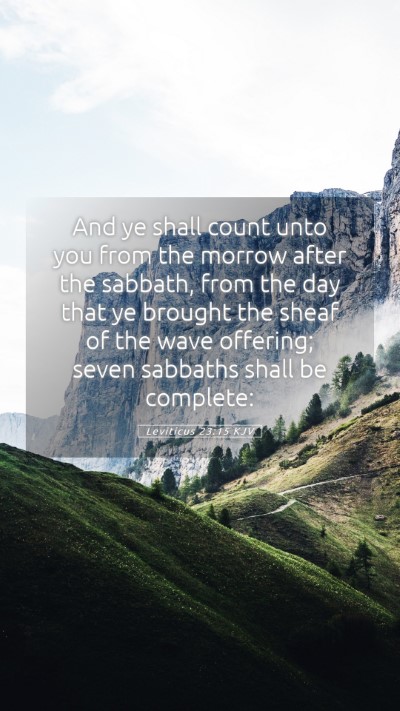Bible Verse Commentary on Leviticus 23:15
Leviticus 23:15 states, "And you shall count for yourselves from the day after the Sabbath, from the day that you brought the sheaf of the wave offering: seven Sabbaths shall be completed." This verse is part of God's instructions to Israel regarding the Feast of Weeks (Shavuot), a significant celebration of harvest and gratitude.
Overview and Meaning
This verse marks the beginning of a 50-day counting period leading to the Feast of Weeks. The command to count "seven Sabbaths" emphasizes the completion and fullness of a period of waiting and preparation. The surrounding context includes not only instructions for the harvest but also the importance of remembrance and thanksgiving towards God for His provisions.
Insights from Public Domain Commentaries
Matthew Henry's Commentary
Matthew Henry notes that this period is marked by both physical and spiritual preparation. The counting signifies an anticipation of God's blessings, fostering a sense of communal celebration among the Israelites. He also emphasizes that the exact timing of the count ties into the faithfulness of God in providing for His people.
Albert Barnes' Commentary
Albert Barnes highlights the agricultural significance of this verse. The sheaf of the wave offering represents the first fruits of the harvest, a reminder of God's provision. Barnes explains that the instructed counting is essential, as it symbolizes faith, waiting on the Lord, and the joyful celebration of the harvest’s completion.
Adam Clarke's Commentary
Adam Clarke expands on the idea of 'counting' by noting it involves a process of reflection and dedication. This act encourages the Israelites to remember their reliance on God throughout the agricultural cycle. Clarke suggests the significance lies in the spiritual growth that comes from such observances, linking it to a deeper relationship with God.
Application of Leviticus 23:15
This verse is not merely a historical instruction; it offers profound meaning for today's believer. Here are several applications drawn from the commentaries:
- Preparation for Blessing: The counting of weeks serves as a metaphor for preparation and anticipation. Believers can reflect on how they prepare for God’s blessings in their own lives.
- Thanksgiving and Gratitude: Just as the Israelites were commanded to celebrate, modern readers are called to cultivate a spirit of gratitude for God's daily provision.
- Community and Fellowship: The communal aspect of the feast reminds believers of the importance of gathering together to celebrate God’s goodness.
- Spiritual Growth: Reflection during this counting period encourages believers to engage in personal and communal spiritual growth.
Cross References
Leviticus 23:15 can be related to several other scripture verses that enrich its understanding:
- Exodus 34:22: Discusses the Feast of Weeks and the offering of first fruits.
- Deuteronomy 16:9-10: Provides additional context on the counting of weeks and the celebration.
- Acts 2:1: Relates to the fulfillment of this Feast in the New Testament with the coming of the Holy Spirit.
- 1 Corinthians 15:20: Points to Christ as the first fruits from the dead, linking the theme of harvest to resurrection.
Conclusion
In summary, Leviticus 23:15 is rich with meaning, inviting believers into a practice of counting and recognizing God’s blessings. Ancient practices, such as those outlined in public domain commentaries, provide insight into how this verse can be understood within the broader narrative of Scripture. Engaging with this passage through bible verse meanings and bible verse interpretations aids in understanding Scripture and applying its truths to our lives today.


